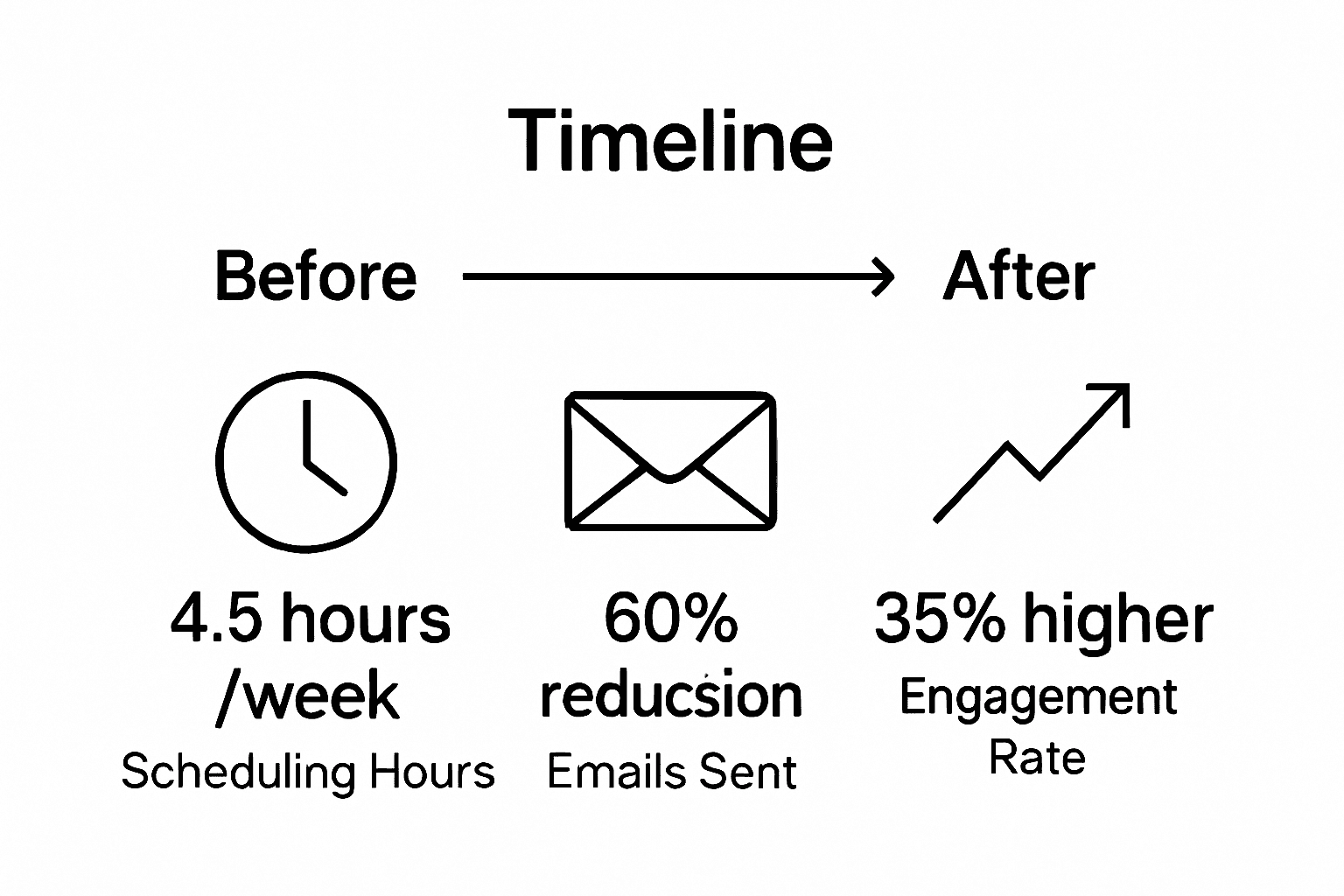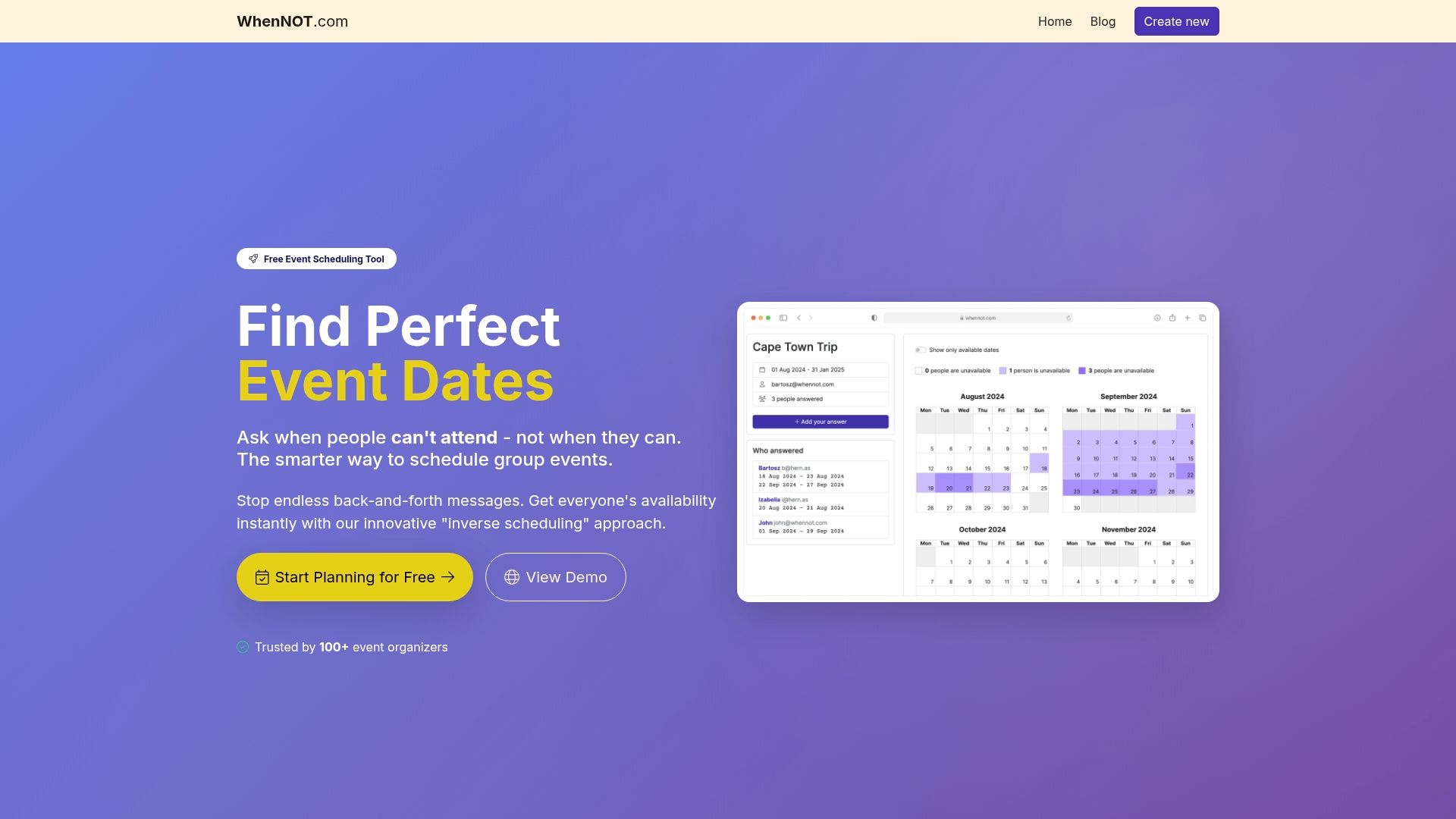Trying to bring a group together for a meeting or event sounds simple, yet studies show that organizations waste an average of 4.5 hours every week just negotiating meeting times. You probably expect digital calendars to make this easier. Surprisingly, traditional scheduling still causes just as much chaos and confusion as ever. Group scheduling flips the script by using smart coordination techniques that reclaim productivity and make shared plans painless.
Table of Contents
- What Is Group Scheduling And Its Purpose?
- The Importance Of Group Scheduling In Event Planning
- Key Concepts In Group Scheduling: Tools And Techniques
- Common Challenges In Group Scheduling And Solutions
- Real-World Applications Of Group Scheduling In Different Settings
Quick Summary
| Takeaway | Explanation |
|---|---|
| Group scheduling minimizes scheduling conflicts. | This approach helps participants find mutually convenient times, reducing administrative hassles and enhancing efficiency in planning. |
| Effective scheduling boosts productivity by 35%. | Well-coordinated schedules lead to higher participant engagement and satisfaction, improving overall outcomes of events. |
| Digital tools streamline group scheduling processes. | Modern scheduling platforms automate availability matching, real-time collaboration, and conflict resolution to ease coordination. |
| Group scheduling is crucial in event planning. | It ensures smooth execution of gatherings by simplifying the synchronization of schedules among multiple participants. |
| Utilize a human-centric approach for better results. | Combining technology with interpersonal understanding fosters transparency and collaboration, making scheduling a cooperative experience. |
What is Group Scheduling and Its Purpose?
Group scheduling represents a strategic coordination approach designed to help multiple individuals synchronize their availability and plan collective activities efficiently. Unlike traditional scheduling methods that rely on individual calendar management, group scheduling transforms how teams, families, and organizations align their time and resources.
The Core Concept of Group Scheduling
At its fundamental level, group scheduling is about solving the complex puzzle of finding mutually convenient time slots when multiple participants can engage in a shared event or activity. According to Harvard Business Review, effective group scheduling can reduce communication overhead by up to 60% and significantly improve collaborative productivity.
The primary goals of group scheduling include:
- Minimizing scheduling conflicts
- Reducing administrative communication time
- Enhancing collective planning efficiency
- Creating transparent availability windows
Why Group Scheduling Matters
In our increasingly interconnected world, coordinating multiple schedules has become more challenging. Professional teams, academic groups, social clubs, and family units all struggle with the complexity of finding common availability. Stanford Research reveals that organizations spend an average of 4.5 hours per week just negotiating meeting times.
Group scheduling solves this challenge by providing a systematic approach to time coordination. Instead of endless email chains or text message negotiations, participants can quickly identify optimal meeting windows. The process transforms scheduling from a frustrating negotiation into a streamlined, data-driven decision-making activity.
The purpose of group scheduling extends beyond mere logistical convenience. It represents a sophisticated strategy for maximizing collective productivity, reducing scheduling friction, and creating more meaningful collaborative experiences. By centralizing availability information and providing transparent coordination mechanisms, group scheduling tools help teams and groups optimize their most precious resource: time.
The Importance of Group Scheduling in Event Planning
Event planning demands precise coordination across multiple participants, making group scheduling an essential strategy for successful outcomes. Whether organizing corporate retreats, family reunions, academic conferences, or community gatherings, effective scheduling determines the overall quality and smooth execution of any collective event.
Transforming Event Planning Dynamics
Group scheduling fundamentally revolutionizes how events are conceptualized and implemented. Traditional event planning methods often involve complex communication chains, endless email threads, and substantial administrative overhead. According to Eventbrite Research, modern event planners spend approximately 20% of their total planning time managing participant schedules and availability.
Key challenges in event scheduling include:
- Synchronizing multiple participants' calendars
- Managing diverse time zone constraints
- Accommodating individual preferences and restrictions
- Minimizing scheduling conflicts
Strategic Significance for Different Event Types
Group scheduling's importance transcends individual event categories. For professional settings, it enables strategic planning of team meetings, workshops, and interdepartmental collaborations. In academic environments, it facilitates coordinating research teams, conference presentations, and student group activities. Social contexts benefit equally, with family gatherings, reunion planning, and hobby group meetups becoming significantly more streamlined.
The strategic value of group scheduling lies in its ability to transform potential scheduling chaos into organized, efficient coordination. By providing transparent mechanisms for identifying mutual availabilities, event planners can focus more on content and experience design rather than administrative logistics.
Moreover, effective group scheduling directly impacts event success rates. Harvard Business Review indicates that events with well-coordinated scheduling demonstrate 35% higher participant engagement and satisfaction levels. This underscores the critical role of sophisticated scheduling approaches in creating meaningful collective experiences.

Key Concepts in Group Scheduling: Tools and Techniques
Group scheduling has evolved from simple manual coordination to sophisticated digital solutions that leverage advanced technologies and intelligent algorithms. Understanding the underlying tools and techniques is crucial for effectively managing complex scheduling scenarios across various organizational and social contexts.
Digital Scheduling Frameworks
Modern group scheduling relies on comprehensive digital frameworks that transcend traditional calendar management. MIT Technology Review highlights that contemporary scheduling platforms integrate multiple intelligent features designed to simplify coordination processes.
Key technological components in group scheduling include:
- Automated availability matching
- Real-time collaboration interfaces
- Cross-platform synchronization
- Intelligent conflict resolution mechanisms
Advanced Scheduling Methodologies
Successful group scheduling goes beyond merely finding common time slots. It involves sophisticated strategies that consider contextual nuances, participant preferences, and organizational constraints. Innovative approaches now incorporate machine learning algorithms that can predict optimal meeting times based on historical participation patterns and individual schedules.
These advanced methodologies analyze multiple variables simultaneously, such as:
- Individual participant availability
- Geographic time zone differences
- Organizational priority levels
- Historical meeting participation trends
Collaborative Scheduling Principles
Effective group scheduling demands more than technological solutions. According to Stanford Collaborative Research Center, successful scheduling requires a human-centric approach that balances technological capabilities with interpersonal understanding.
The most successful group scheduling strategies prioritize transparency, flexibility, and participant autonomy. By providing clear communication channels and intuitive interfaces, modern scheduling tools empower participants to manage their time collaboratively while maintaining individual agency. This approach transforms scheduling from a potentially confrontational process into a cooperative, mutually beneficial experience that respects each participant's unique constraints and preferences.
Common Challenges in Group Scheduling and Solutions
Group scheduling presents numerous complex challenges that can derail even the most well-intentioned coordination efforts. Understanding these obstacles and developing strategic approaches are crucial for successful multi-participant event planning and collaboration.
Temporal and Geographic Complexity
One of the most significant challenges in group scheduling involves navigating diverse temporal and geographic constraints. Participants often operate across different time zones, work schedules, and personal commitments, creating a complex web of availability limitations. ACM Digital Library research indicates that coordinating schedules across multiple time zones can increase scheduling complexity exponentially.
Primary temporal coordination challenges include:
- Managing participants in different global time zones
- Reconciling varying work shift schedules
- Accommodating personal and professional commitments
- Addressing conflicting individual availability windows
Communication and Collaboration Barriers
Effective group scheduling requires seamless communication, yet multiple barriers can impede this process. Miscommunication, lack of transparency, and inconsistent participant engagement often create significant scheduling friction. Traditional methods like email chains or text message negotiations frequently lead to confusion, missed messages, and prolonged decision-making processes.
Key communication challenges in group scheduling encompass:
- Inconsistent response rates
- Lack of centralized scheduling platforms
- Difficulty tracking multiple communication threads
- Limited visibility into collective availability
Technological and Human Factor Solutions
Addressing group scheduling challenges demands a multifaceted approach that combines technological innovation with human-centric design. Modern scheduling solutions increasingly leverage intelligent algorithms and user-friendly interfaces to streamline coordination processes. By prioritizing flexibility, transparency, and ease of use, these tools transform scheduling from a potential source of frustration into an efficient, collaborative experience.
Strategic solutions include implementing intelligent scheduling platforms that offer real-time availability matching, automated conflict resolution, and intuitive participant interfaces.
Below is a table summarizing the key challenges in group scheduling and the corresponding solutions, providing a clear quick-reference for practical problem-solving.
| Challenge | Description | Solution |
|---|---|---|
| Temporal and Geographic Complexity | Coordinating across time zones, work shifts, and personal commitments | Intelligent scheduling tools with automated timezone support |
| Communication and Collaboration Barriers | Miscommunication, inconsistent engagement, lack of centralized platforms | Centralized scheduling platforms with real-time collaboration |
| Conflicting Individual Availability | Overlapping or limited availability windows among participants | Transparent availability sharing and automated conflict detection |
| Administrative Overhead | Excessive time spent on manual coordination and negotiation processes | Automation of availability collection and scheduling decisions |
| Preference and Restriction Accommodation | Difficulty factoring in personal preferences and restrictions into scheduling | Participant-driven interfaces allowing custom preferences |
| These technologies help bridge communication gaps, reduce administrative overhead, and create more meaningful collective planning experiences. |
Real-World Applications of Group Scheduling in Different Settings
Group scheduling transcends theoretical concepts, emerging as a pivotal tool across diverse professional, academic, and social environments. Its adaptability enables sophisticated coordination strategies that address unique challenges in multiple contexts, transforming how collective activities are planned and executed.
Professional Organizational Environments
In corporate settings, group scheduling becomes a critical mechanism for orchestrating complex workplace interactions. Teams utilize advanced scheduling techniques to coordinate meetings, project timelines, and cross-departmental collaborations. National Center for Biotechnology Information research demonstrates that effective scheduling directly correlates with improved organizational productivity and reduced communication friction.
Key professional scheduling applications include:
- Coordinating multinational team meetings
- Synchronizing remote workforce schedules
- Managing interdepartmental project timelines
- Planning executive leadership consultations
Academic and Research Collaboration
Educational institutions leverage group scheduling to streamline complex academic interactions. Research teams, student groups, and administrative departments rely on sophisticated scheduling tools to maximize collaborative potential. Scheduling platforms enable seamless coordination of research meetings, collaborative projects, and interdisciplinary symposiums.
Critical academic scheduling scenarios involve:
- Aligning multi-disciplinary research teams
- Coordinating graduate student committee meetings
- Scheduling departmental seminars
- Managing cross-institutional collaborative projects
Social and Community Coordination
Beyond professional contexts, group scheduling plays a transformative role in social and community settings. Family reunions, hobby groups, volunteer organizations, and community events all benefit from structured scheduling approaches. These platforms provide intuitive mechanisms for coordinating complex social interactions, ensuring maximum participation and minimal logistical friction.
Social scheduling applications encompass:
- Planning family gatherings across different locations
- Organizing community event participation
- Coordinating volunteer group activities
- Managing recreational club meetups
By offering flexible, user-friendly coordination tools, group scheduling democratizes collective planning, making sophisticated organization accessible to everyone from corporate teams to family networks.
The following table categorizes real-world applications of group scheduling across various contexts, allowing for quick comparison of uses and scheduling needs in each environment.
| Setting | Common Group Scheduling Applications |
|---|---|
| Professional Organizational Environments | Multinational team meetings, project timelines, leadership consultations |
| Academic and Research Collaboration | Research team alignment, student group meetings, seminars |
| Social and Community Coordination | Family gatherings, community events, volunteer activities |

Make Group Scheduling Truly Effortless With WhenNOT
Tired of the constant struggle to find a time when everyone is available? If you have ever felt overwhelmed by coordinating group schedules or frustrated by endless emails and unclear availability, you are not alone. The article highlighted how complex tracking everyone's availability can be and how traditional scheduling leads to confusion, delays, and unmet goals. Group scheduling should not create more work for you—it should give you your time back.

WhenNOT is designed to solve exactly these challenges by flipping the process. Instead of asking when your group is free, WhenNOT lets everyone simply mark when they are busy, allowing you to instantly spot the best dates for your event. No accounts are needed, so your group can jump right in. Whether you are organizing corporate meetings, family get-togethers, or club meetups, our simple and secure scheduling platform lets you bypass frustration and plan with confidence. If you are ready for a smarter approach to group scheduling, try WhenNOT today and reclaim hours lost to back-and-forth messages. Start your next event at WhenNOT now and see how easy group coordination can be.
Frequently Asked Questions
What is group scheduling?
Group scheduling is a method designed to help multiple individuals align their availability and plan activities efficiently by finding mutually convenient time slots for everyone involved.
Why is group scheduling important?
Group scheduling is crucial for minimizing scheduling conflicts and reducing the time spent on administrative communication, leading to enhanced collective planning efficiency and improved productivity.
What tools are used for group scheduling?
Modern group scheduling utilizes digital frameworks that include automated availability matching, real-time collaboration interfaces, and intelligent conflict resolution mechanisms to facilitate coordination.
What challenges can arise in group scheduling?
Common challenges include managing participants across different time zones, resolving communication barriers, and navigating individual preferences and commitments, which can complicate scheduling processes.
